Airbnb's Service Marketing Management: Promotion and People Analysis
VerifiedAdded on 2023/06/05
|10
|2536
|421
Report
AI Summary
This report provides an analysis of Airbnb's service marketing management, focusing on the 'Promotions' and 'People' elements of the service marketing mix, based on a personal experience using Airbnb in New Zealand. It highlights Airbnb's promotional strategies, including social media marketing and user-generated content, and assesses the importance of the 'People' element, focusing on hosts and customer service. The report identifies strengths such as effective customer service and promotional reach, and weaknesses such as inconsistent service recovery processes for hosts dealing with problematic guests. Recommendations include enhancing customer engagement through online competitions and improving service recovery strategies to protect hosts, such as implementing stricter guest behavior policies and closer collaboration with local authorities. The report concludes that Airbnb offers a valuable service but needs to focus on customer engagement and robust service recovery to maintain its market position and customer satisfaction.
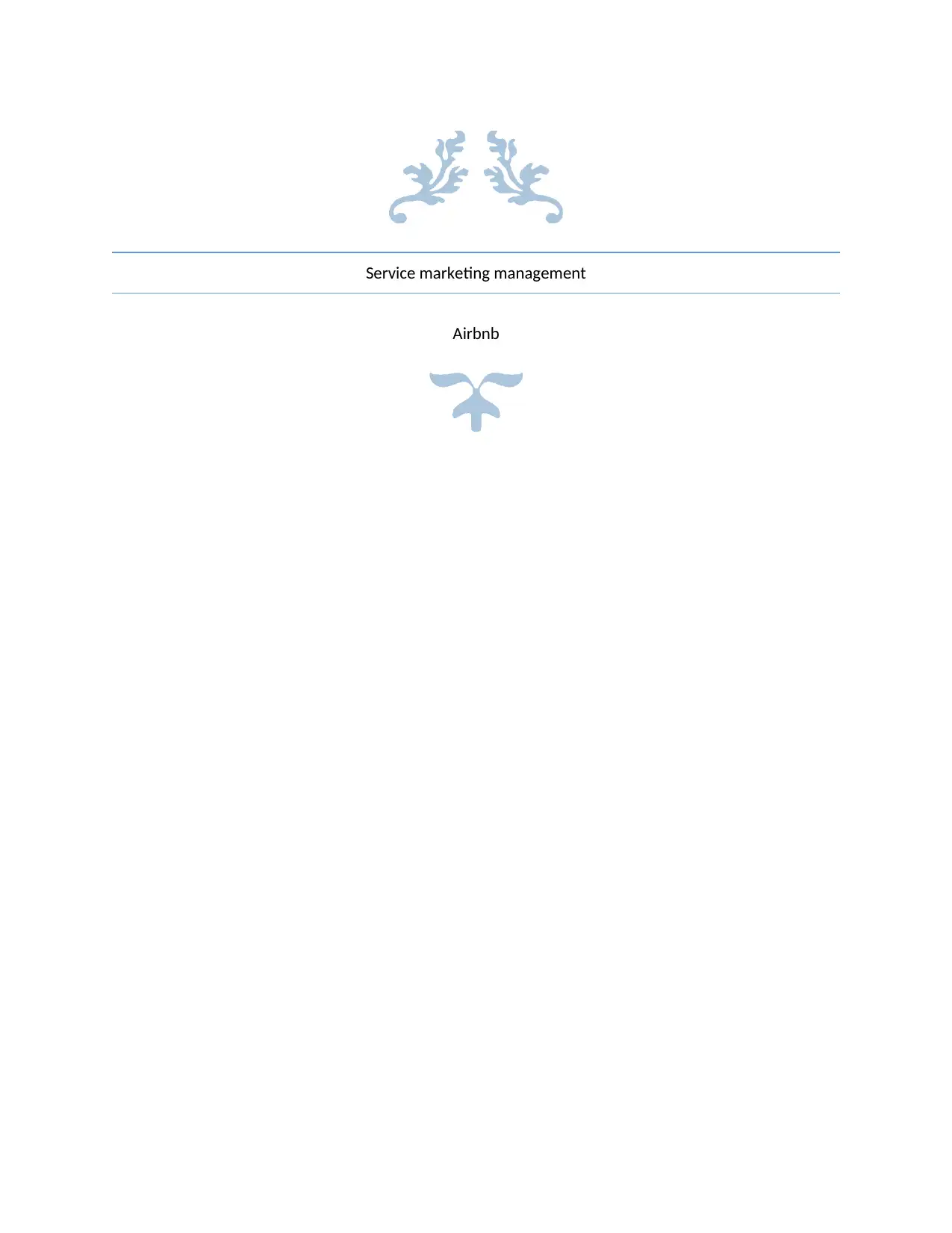
Service marketing management
Airbnb
Airbnb
Paraphrase This Document
Need a fresh take? Get an instant paraphrase of this document with our AI Paraphraser
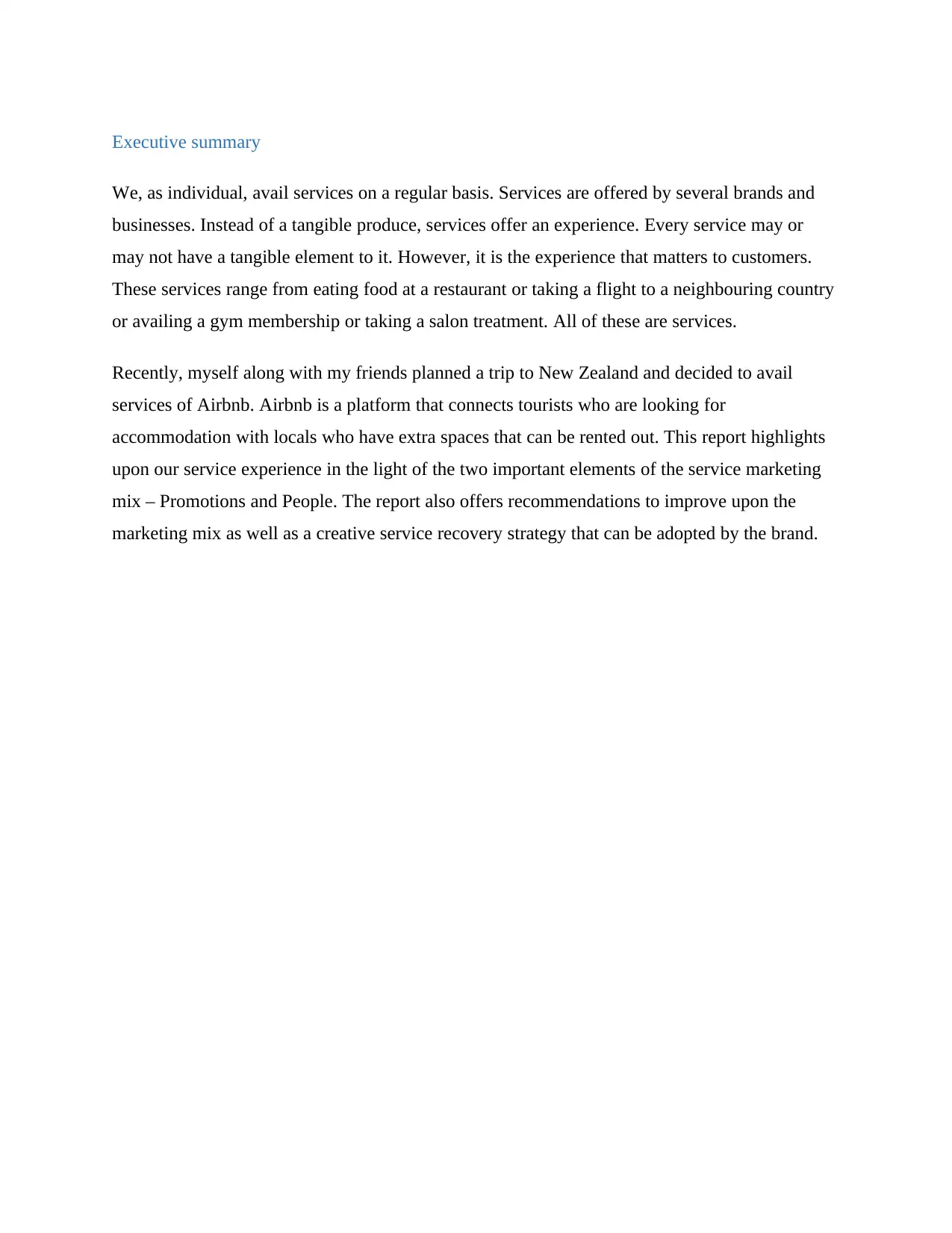
Executive summary
We, as individual, avail services on a regular basis. Services are offered by several brands and
businesses. Instead of a tangible produce, services offer an experience. Every service may or
may not have a tangible element to it. However, it is the experience that matters to customers.
These services range from eating food at a restaurant or taking a flight to a neighbouring country
or availing a gym membership or taking a salon treatment. All of these are services.
Recently, myself along with my friends planned a trip to New Zealand and decided to avail
services of Airbnb. Airbnb is a platform that connects tourists who are looking for
accommodation with locals who have extra spaces that can be rented out. This report highlights
upon our service experience in the light of the two important elements of the service marketing
mix – Promotions and People. The report also offers recommendations to improve upon the
marketing mix as well as a creative service recovery strategy that can be adopted by the brand.
We, as individual, avail services on a regular basis. Services are offered by several brands and
businesses. Instead of a tangible produce, services offer an experience. Every service may or
may not have a tangible element to it. However, it is the experience that matters to customers.
These services range from eating food at a restaurant or taking a flight to a neighbouring country
or availing a gym membership or taking a salon treatment. All of these are services.
Recently, myself along with my friends planned a trip to New Zealand and decided to avail
services of Airbnb. Airbnb is a platform that connects tourists who are looking for
accommodation with locals who have extra spaces that can be rented out. This report highlights
upon our service experience in the light of the two important elements of the service marketing
mix – Promotions and People. The report also offers recommendations to improve upon the
marketing mix as well as a creative service recovery strategy that can be adopted by the brand.

Contents
Executive summary.........................................................................................................................1
Introduction......................................................................................................................................3
Service provider description............................................................................................................3
Target market analysis.....................................................................................................................3
Service performance analysis on two of the 7 Ps............................................................................4
Recommendations............................................................................................................................5
Conclusion.......................................................................................................................................6
References........................................................................................................................................8
Executive summary.........................................................................................................................1
Introduction......................................................................................................................................3
Service provider description............................................................................................................3
Target market analysis.....................................................................................................................3
Service performance analysis on two of the 7 Ps............................................................................4
Recommendations............................................................................................................................5
Conclusion.......................................................................................................................................6
References........................................................................................................................................8
⊘ This is a preview!⊘
Do you want full access?
Subscribe today to unlock all pages.

Trusted by 1+ million students worldwide
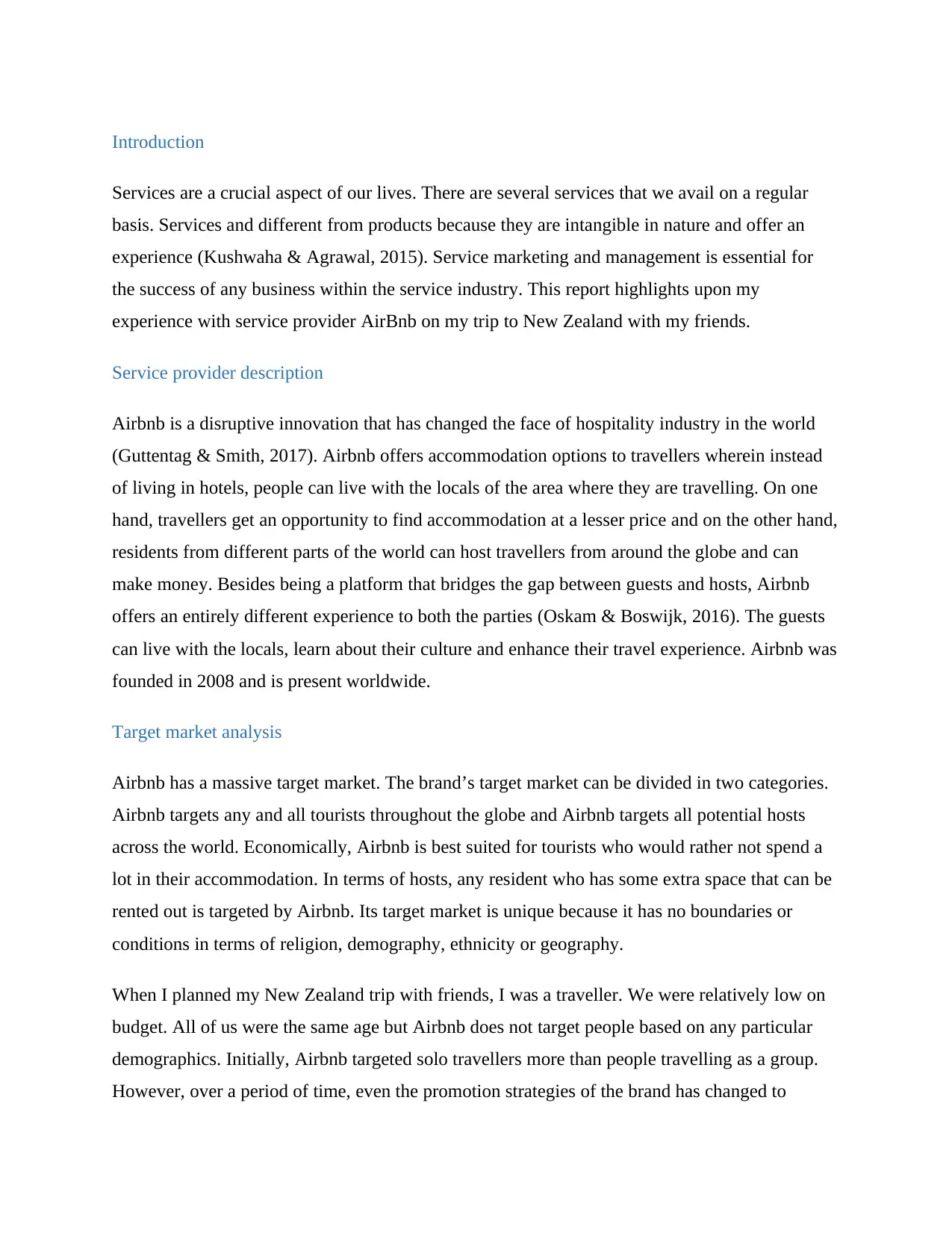
Introduction
Services are a crucial aspect of our lives. There are several services that we avail on a regular
basis. Services and different from products because they are intangible in nature and offer an
experience (Kushwaha & Agrawal, 2015). Service marketing and management is essential for
the success of any business within the service industry. This report highlights upon my
experience with service provider AirBnb on my trip to New Zealand with my friends.
Service provider description
Airbnb is a disruptive innovation that has changed the face of hospitality industry in the world
(Guttentag & Smith, 2017). Airbnb offers accommodation options to travellers wherein instead
of living in hotels, people can live with the locals of the area where they are travelling. On one
hand, travellers get an opportunity to find accommodation at a lesser price and on the other hand,
residents from different parts of the world can host travellers from around the globe and can
make money. Besides being a platform that bridges the gap between guests and hosts, Airbnb
offers an entirely different experience to both the parties (Oskam & Boswijk, 2016). The guests
can live with the locals, learn about their culture and enhance their travel experience. Airbnb was
founded in 2008 and is present worldwide.
Target market analysis
Airbnb has a massive target market. The brand’s target market can be divided in two categories.
Airbnb targets any and all tourists throughout the globe and Airbnb targets all potential hosts
across the world. Economically, Airbnb is best suited for tourists who would rather not spend a
lot in their accommodation. In terms of hosts, any resident who has some extra space that can be
rented out is targeted by Airbnb. Its target market is unique because it has no boundaries or
conditions in terms of religion, demography, ethnicity or geography.
When I planned my New Zealand trip with friends, I was a traveller. We were relatively low on
budget. All of us were the same age but Airbnb does not target people based on any particular
demographics. Initially, Airbnb targeted solo travellers more than people travelling as a group.
However, over a period of time, even the promotion strategies of the brand has changed to
Services are a crucial aspect of our lives. There are several services that we avail on a regular
basis. Services and different from products because they are intangible in nature and offer an
experience (Kushwaha & Agrawal, 2015). Service marketing and management is essential for
the success of any business within the service industry. This report highlights upon my
experience with service provider AirBnb on my trip to New Zealand with my friends.
Service provider description
Airbnb is a disruptive innovation that has changed the face of hospitality industry in the world
(Guttentag & Smith, 2017). Airbnb offers accommodation options to travellers wherein instead
of living in hotels, people can live with the locals of the area where they are travelling. On one
hand, travellers get an opportunity to find accommodation at a lesser price and on the other hand,
residents from different parts of the world can host travellers from around the globe and can
make money. Besides being a platform that bridges the gap between guests and hosts, Airbnb
offers an entirely different experience to both the parties (Oskam & Boswijk, 2016). The guests
can live with the locals, learn about their culture and enhance their travel experience. Airbnb was
founded in 2008 and is present worldwide.
Target market analysis
Airbnb has a massive target market. The brand’s target market can be divided in two categories.
Airbnb targets any and all tourists throughout the globe and Airbnb targets all potential hosts
across the world. Economically, Airbnb is best suited for tourists who would rather not spend a
lot in their accommodation. In terms of hosts, any resident who has some extra space that can be
rented out is targeted by Airbnb. Its target market is unique because it has no boundaries or
conditions in terms of religion, demography, ethnicity or geography.
When I planned my New Zealand trip with friends, I was a traveller. We were relatively low on
budget. All of us were the same age but Airbnb does not target people based on any particular
demographics. Initially, Airbnb targeted solo travellers more than people travelling as a group.
However, over a period of time, even the promotion strategies of the brand has changed to
Paraphrase This Document
Need a fresh take? Get an instant paraphrase of this document with our AI Paraphraser

position itself as family friendly. Airbnb now has several listed hosts who offer their spaces to
families. Therefore target market of Airbnb is solely defined by the target market desired and
preferred by their listed hosts. Some people prefer having families, some prefer having bachelors
while some prefer solo travellers.
Service performance analysis on two of the 7 Ps
Just like products, services have marketing mix elements. These 7 marketing mix elements or the
7 Ps provide more information about the service (Lovelock & Patterson, 2015). This section of
the report aims to analyse two crucial elements of Airbnb’s service marketing mix. These include
promotions and people. Promotion element of the marketing mix tells us about how a business
reaches out to its consumers (Khan, 2014). Promotional strategies devised by any business aim to
aware customers about the product or service as well as establish a positive brand image of their
offering.
Airbnb’s promotion strategies include marketing the brand on traditional as well as digital
platforms. Airbnb advertises its services by asking people to ‘Belong anywhere’. Airbnb’s
television advertisements show first hand experiences of Airbnb customers and the ease of use of
the Airbnb’s mobile application. Social media has been one of the most important tools for
Airbnb’s promotions. Social media marketing refers to the process of promoting a product or
service on social media platforms like Facebook, Instagram, Snapchat, Twitter and even
Pinterest (Felix, Rauschnabel & Hinsch, 2017). Airbnb is active on all these platforms. Any news
from the brand first hits Facebook and Twitter which is where the customer become aware.
One of the best forms of marketing is the word of mouth marketing that comes from customers
of a certain brand. When this word of mouth marketing is conducted on online platforms, it is
known as user generated content. User generated content refers to all the content about a certain
brand that is available on the internet that has been generated by the users of the brand and does
not come from the brand directly (Goes, Lin & Yeung, 2014). Airbnb’s user generated content
on the internet is tremendous. Customers using Airbnb services share pictures on Instagram and
tag the brand or use the hashtag #Airbnb. The #Airbnb currently generates over 2.5 million posts.
This goes to show the strength of Airbnb’s promotions. The strategy adopted by the brand is
families. Therefore target market of Airbnb is solely defined by the target market desired and
preferred by their listed hosts. Some people prefer having families, some prefer having bachelors
while some prefer solo travellers.
Service performance analysis on two of the 7 Ps
Just like products, services have marketing mix elements. These 7 marketing mix elements or the
7 Ps provide more information about the service (Lovelock & Patterson, 2015). This section of
the report aims to analyse two crucial elements of Airbnb’s service marketing mix. These include
promotions and people. Promotion element of the marketing mix tells us about how a business
reaches out to its consumers (Khan, 2014). Promotional strategies devised by any business aim to
aware customers about the product or service as well as establish a positive brand image of their
offering.
Airbnb’s promotion strategies include marketing the brand on traditional as well as digital
platforms. Airbnb advertises its services by asking people to ‘Belong anywhere’. Airbnb’s
television advertisements show first hand experiences of Airbnb customers and the ease of use of
the Airbnb’s mobile application. Social media has been one of the most important tools for
Airbnb’s promotions. Social media marketing refers to the process of promoting a product or
service on social media platforms like Facebook, Instagram, Snapchat, Twitter and even
Pinterest (Felix, Rauschnabel & Hinsch, 2017). Airbnb is active on all these platforms. Any news
from the brand first hits Facebook and Twitter which is where the customer become aware.
One of the best forms of marketing is the word of mouth marketing that comes from customers
of a certain brand. When this word of mouth marketing is conducted on online platforms, it is
known as user generated content. User generated content refers to all the content about a certain
brand that is available on the internet that has been generated by the users of the brand and does
not come from the brand directly (Goes, Lin & Yeung, 2014). Airbnb’s user generated content
on the internet is tremendous. Customers using Airbnb services share pictures on Instagram and
tag the brand or use the hashtag #Airbnb. The #Airbnb currently generates over 2.5 million posts.
This goes to show the strength of Airbnb’s promotions. The strategy adopted by the brand is
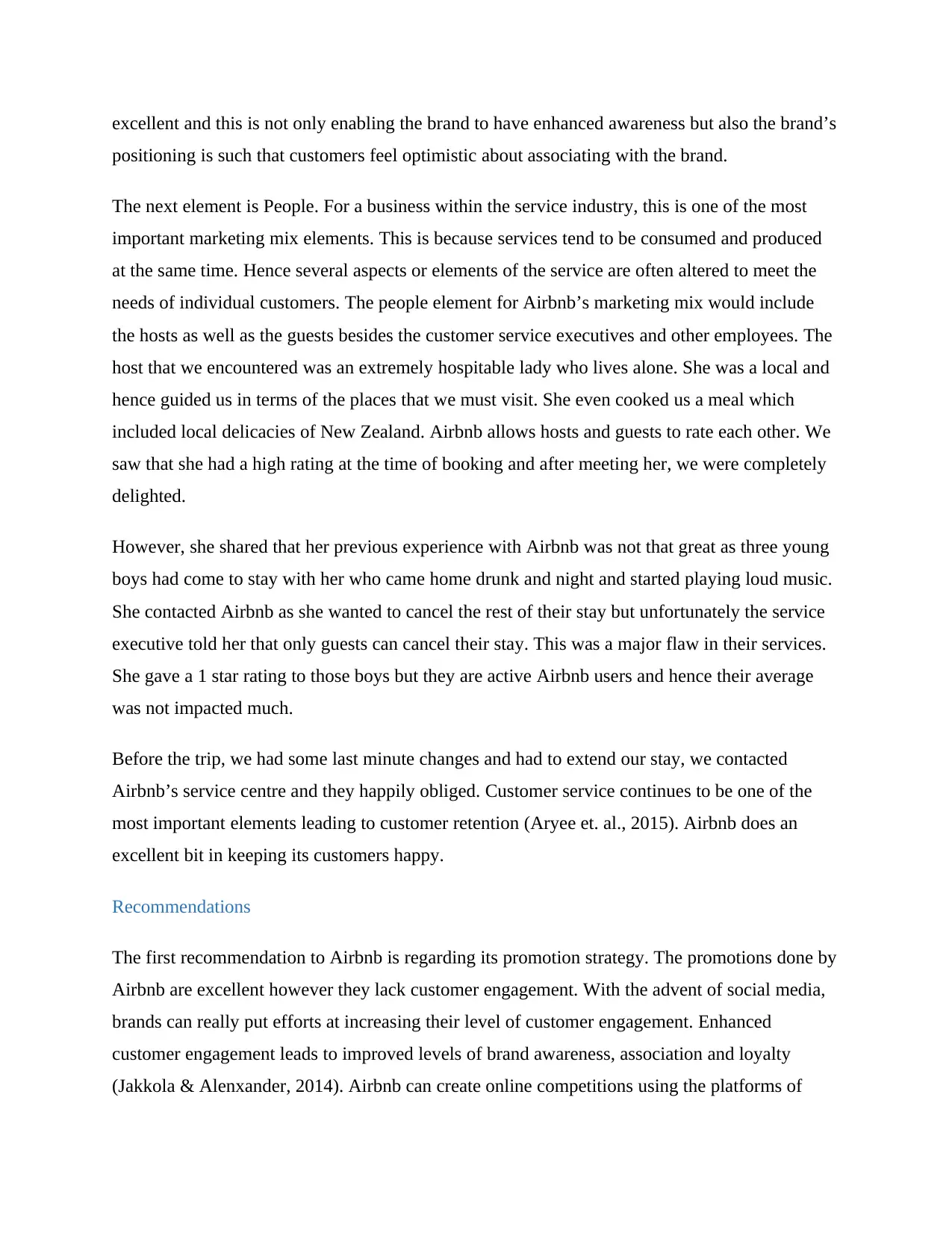
excellent and this is not only enabling the brand to have enhanced awareness but also the brand’s
positioning is such that customers feel optimistic about associating with the brand.
The next element is People. For a business within the service industry, this is one of the most
important marketing mix elements. This is because services tend to be consumed and produced
at the same time. Hence several aspects or elements of the service are often altered to meet the
needs of individual customers. The people element for Airbnb’s marketing mix would include
the hosts as well as the guests besides the customer service executives and other employees. The
host that we encountered was an extremely hospitable lady who lives alone. She was a local and
hence guided us in terms of the places that we must visit. She even cooked us a meal which
included local delicacies of New Zealand. Airbnb allows hosts and guests to rate each other. We
saw that she had a high rating at the time of booking and after meeting her, we were completely
delighted.
However, she shared that her previous experience with Airbnb was not that great as three young
boys had come to stay with her who came home drunk and night and started playing loud music.
She contacted Airbnb as she wanted to cancel the rest of their stay but unfortunately the service
executive told her that only guests can cancel their stay. This was a major flaw in their services.
She gave a 1 star rating to those boys but they are active Airbnb users and hence their average
was not impacted much.
Before the trip, we had some last minute changes and had to extend our stay, we contacted
Airbnb’s service centre and they happily obliged. Customer service continues to be one of the
most important elements leading to customer retention (Aryee et. al., 2015). Airbnb does an
excellent bit in keeping its customers happy.
Recommendations
The first recommendation to Airbnb is regarding its promotion strategy. The promotions done by
Airbnb are excellent however they lack customer engagement. With the advent of social media,
brands can really put efforts at increasing their level of customer engagement. Enhanced
customer engagement leads to improved levels of brand awareness, association and loyalty
(Jakkola & Alenxander, 2014). Airbnb can create online competitions using the platforms of
positioning is such that customers feel optimistic about associating with the brand.
The next element is People. For a business within the service industry, this is one of the most
important marketing mix elements. This is because services tend to be consumed and produced
at the same time. Hence several aspects or elements of the service are often altered to meet the
needs of individual customers. The people element for Airbnb’s marketing mix would include
the hosts as well as the guests besides the customer service executives and other employees. The
host that we encountered was an extremely hospitable lady who lives alone. She was a local and
hence guided us in terms of the places that we must visit. She even cooked us a meal which
included local delicacies of New Zealand. Airbnb allows hosts and guests to rate each other. We
saw that she had a high rating at the time of booking and after meeting her, we were completely
delighted.
However, she shared that her previous experience with Airbnb was not that great as three young
boys had come to stay with her who came home drunk and night and started playing loud music.
She contacted Airbnb as she wanted to cancel the rest of their stay but unfortunately the service
executive told her that only guests can cancel their stay. This was a major flaw in their services.
She gave a 1 star rating to those boys but they are active Airbnb users and hence their average
was not impacted much.
Before the trip, we had some last minute changes and had to extend our stay, we contacted
Airbnb’s service centre and they happily obliged. Customer service continues to be one of the
most important elements leading to customer retention (Aryee et. al., 2015). Airbnb does an
excellent bit in keeping its customers happy.
Recommendations
The first recommendation to Airbnb is regarding its promotion strategy. The promotions done by
Airbnb are excellent however they lack customer engagement. With the advent of social media,
brands can really put efforts at increasing their level of customer engagement. Enhanced
customer engagement leads to improved levels of brand awareness, association and loyalty
(Jakkola & Alenxander, 2014). Airbnb can create online competitions using the platforms of
⊘ This is a preview!⊘
Do you want full access?
Subscribe today to unlock all pages.

Trusted by 1+ million students worldwide

Twitter and Facebook where customers can participate and even win Airbnb vouchers. The brand
can also recognize its loyal customers who are generating content on social media and reward
them. Customer engagement will always create a positive outlook towards the brand (So, Sparks
& Wang, 2016).
Service failure is inevitable in the service industry. However, service recovery is what really
matters if a service failure has been encountered (Xu, Liu & Gursoy, 2018). Airbnb’s most
possible service failure would be loss of hosts owing to bad behaviour on account of guests. It is
important to note that Airbnb hosts are offering their place to absolute strangers solely because
they trust the Airbnb brand. Hence it becomes the responsibility of Airbnb to ensure that guests
living with the hosts do not misbehave. Airbnb currently has a star rating system for guests and
hosts. Besides this, when any erratic behaviour is witnessed, Airbnb should immediately step
forward and take an action. Airbnb should also call customers at the time of booking and explain
the rules decided by the host beforehand. Along with that, guests who misbehave with hosts must
be asked to vacate the house immediately. The guests must be offered assistance in finding other
abodes but if a host in uncomfortable then the guests must leave. Airbnb must also have close
associations with local police and hospitals of the area so that they can be called immediately
when required.
Service recovery strategies adopted by the business form a base for retaining customers in the
longer run (Holloway & Wang, 2015). The customer care representatives or the front officers for
any service have the most important role to play in case of service failure (Boshoff, 2017).
Therefore Airbnb employees working in customer service centre must be active and restorative.
Conclusion
Services are a part of our everyday lives. Services offer an experience rather than a tangible
product. This makes it all the way more important for marketers to promote, produce and recover
their service in an effective manner. Our experience with Airbnb’s service exceeded our
expectations. The brand has offered a superb solution for all accommodation problems of
tourists.
can also recognize its loyal customers who are generating content on social media and reward
them. Customer engagement will always create a positive outlook towards the brand (So, Sparks
& Wang, 2016).
Service failure is inevitable in the service industry. However, service recovery is what really
matters if a service failure has been encountered (Xu, Liu & Gursoy, 2018). Airbnb’s most
possible service failure would be loss of hosts owing to bad behaviour on account of guests. It is
important to note that Airbnb hosts are offering their place to absolute strangers solely because
they trust the Airbnb brand. Hence it becomes the responsibility of Airbnb to ensure that guests
living with the hosts do not misbehave. Airbnb currently has a star rating system for guests and
hosts. Besides this, when any erratic behaviour is witnessed, Airbnb should immediately step
forward and take an action. Airbnb should also call customers at the time of booking and explain
the rules decided by the host beforehand. Along with that, guests who misbehave with hosts must
be asked to vacate the house immediately. The guests must be offered assistance in finding other
abodes but if a host in uncomfortable then the guests must leave. Airbnb must also have close
associations with local police and hospitals of the area so that they can be called immediately
when required.
Service recovery strategies adopted by the business form a base for retaining customers in the
longer run (Holloway & Wang, 2015). The customer care representatives or the front officers for
any service have the most important role to play in case of service failure (Boshoff, 2017).
Therefore Airbnb employees working in customer service centre must be active and restorative.
Conclusion
Services are a part of our everyday lives. Services offer an experience rather than a tangible
product. This makes it all the way more important for marketers to promote, produce and recover
their service in an effective manner. Our experience with Airbnb’s service exceeded our
expectations. The brand has offered a superb solution for all accommodation problems of
tourists.
Paraphrase This Document
Need a fresh take? Get an instant paraphrase of this document with our AI Paraphraser

In order to improve further upon its promotion strategies, the brand must indulge in more
customer engagement strategies such as online quizzes and contests. Also since the brand is
bridging the gap between hosts and guests, the hosts must be given the facility that if they are
uncomfortable with the guests then the guests would have to vacate the premises. The service
failure caused by misbehaving guest seems probable and hence the brand must be ready with
recovery options.
customer engagement strategies such as online quizzes and contests. Also since the brand is
bridging the gap between hosts and guests, the hosts must be given the facility that if they are
uncomfortable with the guests then the guests would have to vacate the premises. The service
failure caused by misbehaving guest seems probable and hence the brand must be ready with
recovery options.
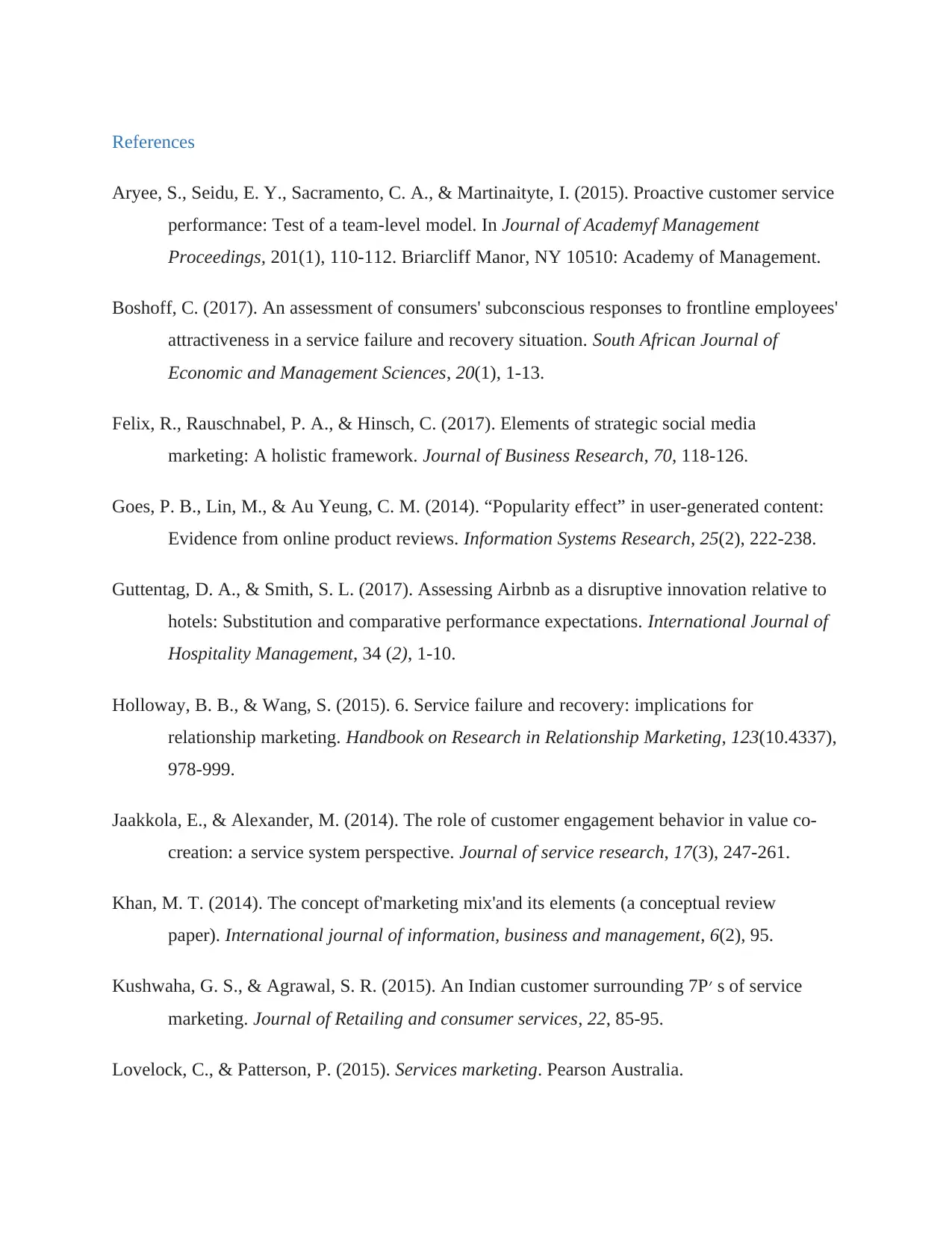
References
Aryee, S., Seidu, E. Y., Sacramento, C. A., & Martinaityte, I. (2015). Proactive customer service
performance: Test of a team-level model. In Journal of Academyf Management
Proceedings, 201(1), 110-112. Briarcliff Manor, NY 10510: Academy of Management.
Boshoff, C. (2017). An assessment of consumers' subconscious responses to frontline employees'
attractiveness in a service failure and recovery situation. South African Journal of
Economic and Management Sciences, 20(1), 1-13.
Felix, R., Rauschnabel, P. A., & Hinsch, C. (2017). Elements of strategic social media
marketing: A holistic framework. Journal of Business Research, 70, 118-126.
Goes, P. B., Lin, M., & Au Yeung, C. M. (2014). “Popularity effect” in user-generated content:
Evidence from online product reviews. Information Systems Research, 25(2), 222-238.
Guttentag, D. A., & Smith, S. L. (2017). Assessing Airbnb as a disruptive innovation relative to
hotels: Substitution and comparative performance expectations. International Journal of
Hospitality Management, 34 (2), 1-10.
Holloway, B. B., & Wang, S. (2015). 6. Service failure and recovery: implications for
relationship marketing. Handbook on Research in Relationship Marketing, 123(10.4337),
978-999.
Jaakkola, E., & Alexander, M. (2014). The role of customer engagement behavior in value co-
creation: a service system perspective. Journal of service research, 17(3), 247-261.
Khan, M. T. (2014). The concept of'marketing mix'and its elements (a conceptual review
paper). International journal of information, business and management, 6(2), 95.
Kushwaha, G. S., & Agrawal, S. R. (2015). An Indian customer surrounding 7P׳ s of service
marketing. Journal of Retailing and consumer services, 22, 85-95.
Lovelock, C., & Patterson, P. (2015). Services marketing. Pearson Australia.
Aryee, S., Seidu, E. Y., Sacramento, C. A., & Martinaityte, I. (2015). Proactive customer service
performance: Test of a team-level model. In Journal of Academyf Management
Proceedings, 201(1), 110-112. Briarcliff Manor, NY 10510: Academy of Management.
Boshoff, C. (2017). An assessment of consumers' subconscious responses to frontline employees'
attractiveness in a service failure and recovery situation. South African Journal of
Economic and Management Sciences, 20(1), 1-13.
Felix, R., Rauschnabel, P. A., & Hinsch, C. (2017). Elements of strategic social media
marketing: A holistic framework. Journal of Business Research, 70, 118-126.
Goes, P. B., Lin, M., & Au Yeung, C. M. (2014). “Popularity effect” in user-generated content:
Evidence from online product reviews. Information Systems Research, 25(2), 222-238.
Guttentag, D. A., & Smith, S. L. (2017). Assessing Airbnb as a disruptive innovation relative to
hotels: Substitution and comparative performance expectations. International Journal of
Hospitality Management, 34 (2), 1-10.
Holloway, B. B., & Wang, S. (2015). 6. Service failure and recovery: implications for
relationship marketing. Handbook on Research in Relationship Marketing, 123(10.4337),
978-999.
Jaakkola, E., & Alexander, M. (2014). The role of customer engagement behavior in value co-
creation: a service system perspective. Journal of service research, 17(3), 247-261.
Khan, M. T. (2014). The concept of'marketing mix'and its elements (a conceptual review
paper). International journal of information, business and management, 6(2), 95.
Kushwaha, G. S., & Agrawal, S. R. (2015). An Indian customer surrounding 7P׳ s of service
marketing. Journal of Retailing and consumer services, 22, 85-95.
Lovelock, C., & Patterson, P. (2015). Services marketing. Pearson Australia.
⊘ This is a preview!⊘
Do you want full access?
Subscribe today to unlock all pages.

Trusted by 1+ million students worldwide

Oskam, J., & Boswijk, A. (2016). Airbnb: the future of networked hospitality
businesses. Journal of Tourism Futures, 2(1), 22-42.
So, K. K. F., King, C., Sparks, B. A., & Wang, Y. (2016). The role of customer engagement in
building consumer loyalty to tourism brands. Journal of Travel Research, 55(1), 64-78.
Xu, X., Liu, W., & Gursoy, D. (2018). The Impacts of Service Failure and Recovery Efforts on
Airline Customers’ Emotions and Satisfaction. Journal of Travel Research, 0047-0049
businesses. Journal of Tourism Futures, 2(1), 22-42.
So, K. K. F., King, C., Sparks, B. A., & Wang, Y. (2016). The role of customer engagement in
building consumer loyalty to tourism brands. Journal of Travel Research, 55(1), 64-78.
Xu, X., Liu, W., & Gursoy, D. (2018). The Impacts of Service Failure and Recovery Efforts on
Airline Customers’ Emotions and Satisfaction. Journal of Travel Research, 0047-0049
1 out of 10
Related Documents
Your All-in-One AI-Powered Toolkit for Academic Success.
+13062052269
info@desklib.com
Available 24*7 on WhatsApp / Email
![[object Object]](/_next/static/media/star-bottom.7253800d.svg)
Unlock your academic potential
Copyright © 2020–2026 A2Z Services. All Rights Reserved. Developed and managed by ZUCOL.





